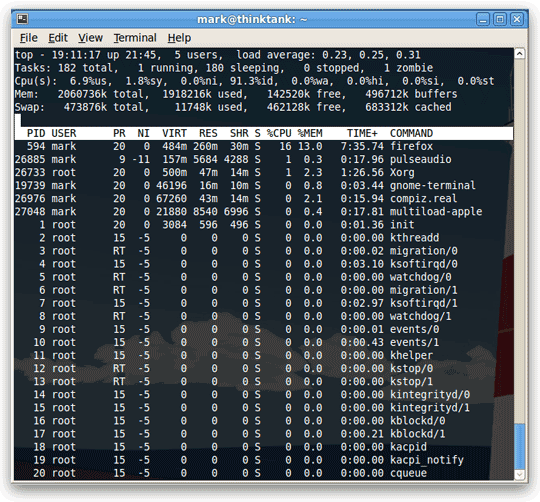When talking about processes priority
is all about managing processor time. The Processor or CPU is like a human
juggling multiple tasks at the same time. Sometimes we can have enough room to
take on multiple projects. Sometimes we can only focus on one thing at a time.
Other times something important pops up and we want to devote all of our energy
into solving that problem while putting less important tasks on the back
burner.
In Linux we can set guidelines for the CPU to follow when it is
looking at all the tasks it has to do. These guidelines are called niceness or nice value. The
Linux niceness scale goes from -20 to 19. The lower the number the more
priority that task gets. If the niceness value is high number like 19 the task
will be set to the lowest priority and the CPU will process it whenever it gets
a chance. The default nice value is zero.
By using this scale we can allocate our CPU resources more
appropriately. Lower priority programs that are not important can be set to a
higher nice value, while high priority programs like daemons and services can
be set to receive more of the CPU’s focus. You can even give a specific user a
lower nice value for all of his/her processes so you can limit their ability to
slow down the computer’s core services.
Checking the Priority of Running Processes
The easiest way to get a quick picture of what the current niceness
priority on a process is to open up the top processes with:
top

Another way you can get the nice value
is use ps:
ps -o pid,comm,nice -p 594
This will output the process ID, command, and nice value (marked
as NI).

Setting priority on new processes
At this point you are probably wondering how you can set your
own priority levels on processes. To change the priority when issuing a new
command you do nice -n [nice value] [command]:
nice -n 10 apt-get upgrade
This will increment the default nice
value by a positive 10 for the command, ‘apt-get upgrade’ This is often useful for times when you want to upgrade apps
but don’t want the extra process burden at the given time. Remember a positive
number is gives less priority for a process.
Setting Priority on Existing Processes
Obviously at some point you are going to want to alter the nice
value of something that is already running. Just the other day I was doing an
upgrade to Ubuntu Jaunty and Firefox started to become unusably slow. A quick renice command rescheduled the upgrade to a lower priority and I was
back to surfing in no time.
To change the priority of an existing process just do renice
[nice value] -p [process id]:
renice 10 -p 21827
This will increment the priority of
the process with an id of 21827 to 10.
Note: Only root can apply
negative nice values.

Setting Permanent Priority on all
Processes for a Specific User
Sometimes it is helpful to give specific users lower priority
than others to keep system resources allocated in the proper places like core
services and other programs.
You can set the default nice value of a particular user or group
in the/etc/security/limits.conf file.
/etc/security/limits.conf
It uses this syntax: [username] [hard|soft] priority [nice
value]
backupuser hard priority 1